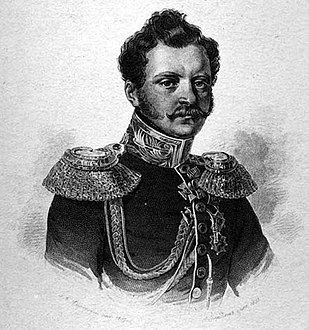Fyodor Iordan
Fyodor Iordan | |
|---|---|
| Фёдор Иванович Иордан | |
 Fyodor Iordan by Sergey Zaryanko (1855) | |
| Born | 13 August 1800 Pavlovsk, Saint Petersburg, Russia |
| Died | 19 September 1883 (aged 83) Saint Petersburg, Russia |
| Resting place | Smolensky Cemetery, St. Petersburg |
| Education | Nikolai Utkin |
| Alma mater | Imperial Academy of Arts (1827) |
| Known for | Engraving |
| Awards | |
| Elected | Member Academy of Arts (1844) Professor by rank (1850) |
Friedrich Ludwig Jordan,[1] russified as Fyodor Ivanovich Iordan[1] (13 August 1800 - 19 September 1883) was a Russian engraver and art professor. He was best known for portraits and reproductions of the Old Masters.
Biography
[edit]His father was the upholsterer for the Imperial Court.[2] He was enrolled in the primary school courses at the Imperial Academy of Arts and, in 1819, entered the engraving class, serving as an apprentice of Nikolai Utkin.[3] He graduated in 1824 and received a gold medal for his engraving, "Mercury lulls Argus", after a painting by Pyotr Sokolov. Shortly after, he was awarded another gold medal at one of the Academy's exhibitions for his rendering of the "Dying Abel", after a work by Anton Losenko.[2]
In 1829, he went to Paris, where he studied with Théodore Richomme. When the July Revolution began, he moved to London, continuing his studies with Abraham Raimbach and John Henry Robinson.[2] In 1834, he settled in Rome where, at the urging of Karl Briullov, he produced a huge engraving of the Transfiguration by Raphael, which took him twelve (some sources say fifteen) years to complete.[3] As a result of this work, he became an honorary member of the Academy of Arts, Berlin and the Accademia delle Arti del Disegno in Florence.[2] He was named an Academician by the Imperial Academy in 1844 and was awarded the title of Professor in 1850, when he returned to Saint Petersburg.
After the death of Stepan Galaktionov in 1854, he became head of the engraving department at the Academy and was appointed an assistant curator for prints and drawings at the Hermitage.[2] The following year, he married Varvara Pushchin (1833-1916), a close relative of the poet, Pyotr Pletnyov. In 1861, he gave private engraving lessons to Taras Shevchenko.[4] He was promoted to head curator of prints after the death of Nikolai Utkin in 1863. Eight years later, he became a Rector in the painting and sculpture departments (the only time this position has been held by an engraver)[3] and, in 1876, was named a superintendent in the mosaic division. Towards the end of his life, he was appointed Privy Councilor.
Selected portraits
[edit]References
[edit]- ^ a b Russian: Фри́дрих Лю́двиг Иорда́н, Фёдор Ива́нович Иорда́н.
- ^ a b c d e Сомов, Андрей Иванович (1894). Иордан, Федор Иванович. Энциклопедический словарь Брокгауза и Ефрона [Brockhaus and Efron Encyclopedic Dictionary] (in Russian). Vol. XIIIa: Исторические журналы — Калайдович. St. Petersburg. pp. 753–754 – via Russian WikiSource.
{{cite encyclopedia}}: CS1 maint: location missing publisher (link) - ^ a b c "Jordan Fedor Ivanovich". PetroArt..
- ^ Taras Shevchenko. Works: "Dnepr", 1971, Vol. V, p. 176-177.
Further reading
[edit]- Iordan, Fyodor I. (2012). Belyaev, Nikolai S. (ed.). Записки ректора и профессора Академии художеств Федора Ивановича Иордана (PDF) (in Russian). Saint Petersburg: Library of the Russian Academy of Sciences. ISBN 978-5-336-00142-6. OCLC 864924257.
- Собко, Николай Петрович (1897). Иордан, Федор Иванович. Русский биографический словарь [Russian Biographical Dictionary]. Vol. 8: Ибак — Ключарев. pp. 321–326 – via Russian WikiSource.
External links
[edit]![]() Media related to Fyodor Iordan at Wikimedia Commons
Media related to Fyodor Iordan at Wikimedia Commons
- Fyodor Iordan at the Russian Academy of Arts' official website
- Imperial Academy of Arts alumni
- Awarded with a large gold medal of the Academy of Arts
- Members of the Imperial Academy of Arts
- Academic staff of the Imperial Academy of Arts
- 1800 births
- 1883 deaths
- Engravers from the Russian Empire
- People from Pavlovsk, Saint Petersburg
- Art directors from the Russian Empire
- Curators from Saint Petersburg




